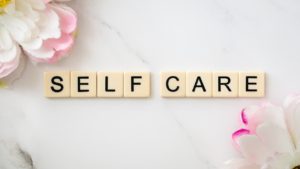Self-Care
It’s a term that probably isn’t new to you. From social media to your therapist, and now to your dietitian, everyone seems to be discussing the importance of spending some quality time alone, decompressing. But what exactly is a self-care practice, and why has it become so important?
Let’s talk self-care: what it might look like for you (it doesn’t need to be those candlelit baths all over social media), why it’s a vital part of a daily routine, and most importantly, why it’s relevant to nutrition.

Emotions
We’re human beings, and as human beings, we experience emotions that come from situations that are out of our control. We feel what we feel when we feel it.
We don’t need to apologize for it. However, at a certain point, it’s just too much; we need a healthy way to release the way we feel: such as
- the stress of the workday that lingers in your body
- the pressure of mounting responsibilities echoing in your head
- the comment that triggered uneasiness in the body
- a look the boss displayed when reading the report that felt like the father’s disapproval stare
Self-Care Practice
Without a self-care practice to reestablish a more calming outlook, we risk lashing out on a partner/friend/family/member or using food for a distraction from emotions that may be regretted.
So, how exactly do we channel these emotions into a conducive self-care practice? If this is something new to you, you might try the V.E.N.T. approach.
VENT
V.E.N.T.
V: Voicing your frustration
E: Exercising your body and mind
N: Nutrition- fueling your body
T: Treating yourself
V- Voicing your frustration
When we start to hit that breaking point of emotions, one of the easiest ways to decompress is to simply voice our concerns. This might be verbal, as in talking to a partner/friend/family member/therapist, but it could also be journalling thoughts on paper.
The key is to find a way to call attention to exactly what’s been eating at us, put in words, and release it. If we put our emotions into words, we can release them from our bodies. Of course, this isn’t a cure-all, but venting is a wonderful practice to avoid letting harmful thoughts fester. Clients I work with sometimes discover that their emotional eating is tied to holding in emotions and not using venting techniques.
Remember that positive messaging for self-care is important also. Find some ways to fill your body with positive thoughts.
E- Exercising your body and mind
Our bodies are designed to move. As a result, we are naturally happier in motion. Finding pockets in your day where you can incorporate movement is a great addition to a self-care practice.
Your activity can be anything that brings movement that brings you joy:
- walking
- biking
- going to aerobics class
- taking a dance class
- playing with children
How to start a meditation practice
While physical activity is beneficial for both body and mind, incorporating mindfulness exercises can be a really wonderful compliment. It seems everyone is talking about meditation right now. If meditation seems a bit daunting, try something you already enjoy doing.
coloring
solving puzzles
simply laying down on the couch
focus on breathing patterns
Taking just five minutes every day to still the mind by focusing on one task can have an incredibly soothing effect, and with consistency, can cultivate an even mind that lasts throughout each day.
N- Nutrition
Eating habits can support any self-care routine. Fueling your body for energy, while stabilizing large swings in hormones and blood sugars impacts how you feel.
Food is broken down into the basic fueling blocks for the body. When your body is receiving key nutrients, it functions better. Of course, the reverse is also true, if your body is not receiving key nutrients, it will not function well.
Think about what would happen if you put soda in the gas tank of a car. The car is not meant to run on soda. Problems can arise with going places due to how the car performs from missing the necessary fuel to go places. An excessive amount of soda could cause damage to the car. The same thing goes for water. If a car does not have enough water in the radiator, it can overheat and break down.
Your body works the same way as a car. Loss of energy (fuel) for the brain is linked to poor attention and cognitive functioning. The primary fuel for your muscles is glucose, which comes from carbohydrates. If you are not getting enough carbohydrates for your body, you may be lacking the energy for your body to move. If you are not getting enough water for your body, it will also overheat.
The brain’s primary fuel source is glucose. Not only will fueling your body with key nutrients help with having more energy, but it also can help to prevent mood changes and energy crashes (think: hangriness!)
T- Treat yourself to something you enjoy
Lastly, and certainly not least find ways to truly allow yourself to enjoy something, guilt-free. It might be food, but it doesn’t have to be! Allow yourself to take a night or day off every now and then. While you know that practicing self-care is important, you may have a hard time actually taking the time to do this.
Just like the overhead speaker announces on the plane, put your mask on first before you help those around you. If you do not “fill your cup,” or rejuvenate your body, mind, and soul from all you are asking of it, you can’t expect to function as well as you could.
Rejuvenating Ideas
take a warm bath
go to bed early
get a massage
watch a movie
go to a play
take a vacation
spend time in nature
Now you may say, T for a treat, I treat myself to my favorite ice cream when I have big emotions. Guess what, that is OK!
There is nothing wrong with emotional eating. Emotional eating might keep you safe from stronger emotions and provide a sense of calm.

However, emotional eating may feel out of control for you, and the repercussions of what happens because of what you tell yourself or how you treat yourself may be more of the problem. There could also be biological factors contributing to the emotional eating that you actually do have in your control.
These biological factors loop back to Nutrition. Self-care can also mean carving out time to work on your nutrition.
You don’t have to do this by yourself, having an expert work with you can help maximize your nutrition game plan and is also a form of self-care!




